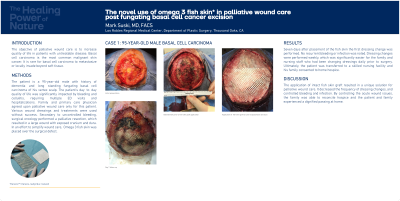Case Series/Study
(CS-135) A Novel Use Omega 3 Fish Skin* in Palliative Wound Care

The objective of palliative wound care is to increase quality of life in patients with untreatable disease. Basal cell carcinoma is the most common malignant skin cancer. It is rare for basal cell carcinoma to metastasize or locally invade beyond soft tissue.
Methods:
The patient is a 95-year-old male with history of dementia and long standing fungating basal cell carcinoma of his vertex scalp. The patient’s day-to-day quality of life was significantly impacted by bleeding and cellulitis, requiring multiple ED visits and hospitalizations. Family and primary care physician agreed upon palliative wound care for this patient. Various wound dressings and treatments were used without success. Secondary to uncontrolled bleeding, surgical oncology performed a palliative resection which resulted in a large wound with exposed cranium and dura. In an effort to simplify wound care, omega 3 fish skin* was placed over the surgical defect.
Results:
Seven days after placement of the fish skin* the first dressing change was performed. No recurrent bleeding or infection was noted. Dressing changes were performed weekly, which was significantly easier for the family and nursing staff who had been changing dressings daily prior to surgery. Ultimately, the patient was transferred to a skilled nursing facility and his family consented to home hospice.
Discussion:
The application of omega 3 fish skin graft* resulted in a unique solution for palliative wound care. It decreased the frequency of dressing changes, and controlled bleeding and infection. By controlling the acute wound issues, the family was able to reconcile hospice and the patient and family experienced a dignified passing at home.
Trademarked Items: *KerecisTM
References:

.png)